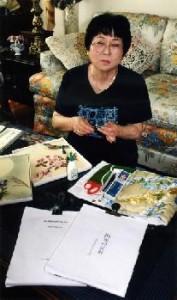Hiroshima Girls, Part 1: Life in Canada [6]
Jul. 3, 2010
Autobiography published in English and Japanese to hand down A-bomb experience
by Masami Nishimoto, Staff Writer
This feature series on the "Hiroshima Girls," also known as "Hiroshima Maidens," is a close look at a number of Japanese women who were impacted by the atomic bombing of Hiroshima. The series was originally published in 1996.
Misako Tachibana, 66, and her husband Hiroshi, 60, live alone. They have no children. "We wanted children," she said evenly, "but weren't able to because of me."
In their third year of marriage, when Ms. Tachibana was 40, she received the long-awaited news that she was pregnant. The couple rejoiced and were about to complete the paperwork for the purchase of a new home when the news proved to be false. "I think it was partly due to my exposure to the radiation from the atomic bomb," she said. The doctor told her that her kidney was underdeveloped and smaller in size than a normal organ.
Still, her work as a beautician continued smoothly. Cheering themselves up again, the couple bought a house that eventually contained her shop "Misako's Beauty Salon." Despite her two dysfunctional fingers, no one was quicker and more precise with their hands.
When asked about her fingers, Ms. Tachibana shared the suffering and the scenes she experienced on the day of the atomic bombing. She told how she was able to regain the courage to live thanks to the love of many people she met through her surgeries in the United States. Above all, she said she "abhors war."
"People in Canada ask frankly about my scars, but they don't just sympathize, they listen attentively when I tell them about my experience." She seemed to imply a difference between Japan and Canada in this regard.
In the small but close-knit Japanese-Canadian community in Winnipeg, she has made many friends. Hiroshi landed a job as an accountant at the Japanese Consulate there. They intended to live out there lives in Winnipeg, but then things took an unexpected turn.
The consulate was abruptly closed in 1992, and her husband lost his job. Two years later Hiroshi relocated from Winnipeg to Calgary, alone, to work for a travel agency that offered tours of the Canadian Rockies. Ms. Tachibana, thinking "A husband and wife should live together; you never know how much longer you'll be in good health," retired from her career as a beautician after 36 years. Thus, they sold their home and shop, and moved to Calgary, 1300 kilometers to the west.
"I'm happy now," Ms. Tachibana said. On the 50th anniversary of the atomic bombing, in 1995, she appeared for the first time in Canadian newspapers and on TV. This exposure led to a reunion with "Papa-san," the father of the host family who cared for her during her stay in the United States for surgery. The former dentist, who was now in Nevada, had lost his wife and lived alone. Ms. Tachibana tidied his house, did his laundry, and talked with him at length.
She explained: "When I was staying with him during the treatment time, I didn't speak much English, so I could only engage in 'baby talk' back then. But this time were able to take part in adult conversations. We were able to share our joy and our sorrow." Ms. Tachibana's face glowed as she turned the pages of the photo album from her days as a "Hiroshima Girl."
These days, she takes care of her garden, enjoys Chigiri-e (a Japanese art assembling pictures from torn paper), and chats with her elderly first-generation Japanese-Canadian neighbors. Now eligible for three kinds of pensions, she is enjoying her life to the fullest. She tries not to dwell on her A-bomb experience, saying, "Everyone has health problems of one kind or another when they get older." Still, she never fails to undergo a medical checkup at the Hiroshima Red Cross Hospital & Atomic-bomb Survivors Hospital each time she returns to Hiroshima.
Her sister, two years older, and her sister's family live in Hiroshima. "I would be happy if my nephews and nieces could learn about the life their aunt has led," Ms. Tachibana said. "With this thought in mind, I began writing my autobiography."
Detailing the full sweep of her life, she completed her memoir and titled it Reflections of the Flash. To translate the book into English, she received support from the best man at their wedding and local Japanese-Canadians. She will soon self-publish the book in both Japanese and English. One of the "Hiroshima Girls" living in Hiroshima contributed the foreword to the book.
Hiroshi recently retired from the travel agency and the couple are now enjoying their retirement together. "We've met many wonderful people over the years," she said. "I can now talk about my past in this way, happy that I have lived." She flashed a winning smile.
(Originally published on June 21, 1996)








